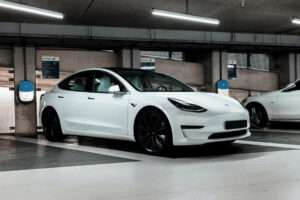
Home / EV Charging News / Electric Cars and Smart City Initiatives
As cities worldwide embark on the journey toward becoming smarter and more sustainable, electric vehicles (EVs) are emerging as pivotal components of smart city initiatives. This article delves into the intersection of electric cars and smart city planning, analyzing how EVs are contributing to data integration, traffic management, and urban planning strategies for a greener and more connected future.
The increasing adoption of electric vehicles is reshaping urban landscapes. Electric cars, with their zero-emission profiles, align seamlessly with the goals of smart cities by promoting cleaner transportation options. As cities envision a future with reduced environmental impact, the role of electric mobility becomes integral to achieving these aspirations.
Electric vehicles embody sustainability, a core principle of smart city initiatives. By transitioning from traditional combustion engines to electric propulsion, cities aim to reduce air pollution, decrease carbon footprints, and create healthier living environments. Electric cars, therefore, serve as catalysts for a sustainable and intelligent urban future.
Electric vehicles, equipped with advanced telematics and connectivity features, contribute valuable data to the smart city ecosystem. Real-time information on vehicle performance, charging patterns, and traffic conditions enhances the city’s ability to make informed decisions. Connected electric vehicles become data nodes, creating a dynamic and responsive urban transportation network.
Electric cars play a crucial role in the integration of smart grids. As part of a holistic energy management strategy, electric vehicles can communicate with the grid to optimize charging times, leverage renewable energy sources, and contribute to load balancing. This bidirectional communication transforms electric vehicles into intelligent energy assets within the city’s infrastructure.
Smart cities are envisioning the creation of e-mobility hubs—centralized locations equipped with charging infrastructure, smart parking, and integrated public transportation options. Electric vehicles become integral components of these hubs, promoting seamless multimodal transportation and reducing congestion in city centers.
Electric cars contribute to intelligent traffic management through connected technologies. Real-time traffic data from electric vehicles aids in optimizing traffic flow, identifying congestion points, and implementing dynamic routing solutions. This data-driven approach enhances overall transportation efficiency and minimizes environmental impact.
Smart city initiatives involve the strategic development of infrastructure to support electric mobility. This includes the deployment of charging stations at key locations, such as residential areas, commercial districts, and public spaces. Urban planning integrates the needs of electric vehicle owners, ensuring a comprehensive and accessible charging network.
Cities are designing green corridors—dedicated routes with charging infrastructure—to encourage the use of electric vehicles. These corridors prioritize sustainability and create efficient transportation pathways for electric cars. Urban planning strategies focus on developing sustainable transport options that align with the principles of smart and green cities.
Barcelona has embraced electric mobility as part of its smart city vision. The city’s comprehensive urban mobility plan includes the development of charging infrastructure, incentives for electric vehicle adoption, and the integration of EV data into the city’s intelligent transportation systems.
Singapore’s commitment to becoming a Smart Nation includes a strong emphasis on electric mobility. The city-state has implemented a nationwide charging network, smart parking solutions, and initiatives to encourage electric vehicle usage. Singapore’s smart city approach leverages electric cars as key components of its urban transportation ecosystem.
One challenge in integrating electric cars into smart city initiatives is addressing charging infrastructure gaps. Cities must strategically plan the placement of charging stations, considering residential areas, commercial centers, and public spaces. Overcoming this challenge involves collaborative efforts between city planners, utilities, and private stakeholders.
The future of smart city initiatives involves the integration of autonomous electric fleets. Electric, autonomous vehicles can offer on-demand transportation services, optimize traffic flow, and further reduce the environmental impact of urban mobility. The convergence of electric and autonomous technologies represents the next frontier in smart and sustainable urban transportation.
The evolution of smart cities involves the advancement of Vehicle-to-Everything (V2X) communication. Electric vehicles equipped with V2X technology can communicate with each other, infrastructure, and even pedestrians. This interconnected system enhances safety, reduces traffic congestion, and creates a seamless flow of information within the urban transportation network.
In smart cities, dynamic charging solutions are envisioned to play a significant role. Electric vehicles equipped with dynamic charging capabilities can charge wirelessly while in motion, eliminating the need for frequent stops at traditional charging stations. This innovation extends the range of electric vehicles and ensures uninterrupted mobility within the city.
The future of electric cars in smart cities relies on strong public-private partnerships. Collaborative ecosystems involving government entities, private businesses, and technology providers are crucial for the successful integration of electric vehicles into urban landscapes. Shared goals and investments can drive the development of comprehensive smart city solutions.
The concept of Mobility as a Service (MaaS) envisions a seamless, integrated transportation experience. Electric vehicles are integral to MaaS, providing citizens with convenient, on-demand transportation options. This shift toward shared mobility reduces the overall number of vehicles on the road, contributing to reduced congestion and improved air quality.
To foster the adoption of electric vehicles, smart cities invest in education and awareness programs. Citizens need to be informed about the benefits of electric mobility, charging infrastructure locations, and the environmental impact of their transportation choices. These programs create a well-informed citizenry that actively participates in the city’s sustainability initiatives.
Smart cities implement incentives to encourage electric vehicle adoption. These incentives may include tax credits, reduced registration fees, and access to exclusive lanes. By making electric mobility more attractive, cities can accelerate the transition toward a cleaner and more sustainable transportation ecosystem.
Smart city initiatives rely on continuous monitoring and data analytics to optimize urban mobility. Electric vehicles contribute to this data pool, providing insights into travel patterns, charging behaviors, and overall transportation dynamics. This data-driven approach enables cities to adapt their infrastructure and policies to evolving mobility needs.
The integration of electric cars into smart cities necessitates agile and adaptive policy development. Cities must respond to changing technologies, market trends, and citizen preferences. Flexible policies that promote innovation, sustainability, and inclusivity create an environment where electric vehicles can thrive as integral components of the urban mobility landscape.
In conclusion, the synergy between electric cars and smart city initiatives represents a harmonious convergence of sustainability and connectivity. As electric vehicles become integral components of urban planning, traffic management, and data-driven decision-making, cities are poised to create intelligent, green, and resilient transportation ecosystems. The future envisions a connected urban landscape where electric mobility plays a pivotal role in shaping sustainable, efficient, and enjoyable urban experiences for citizens around the globe.



